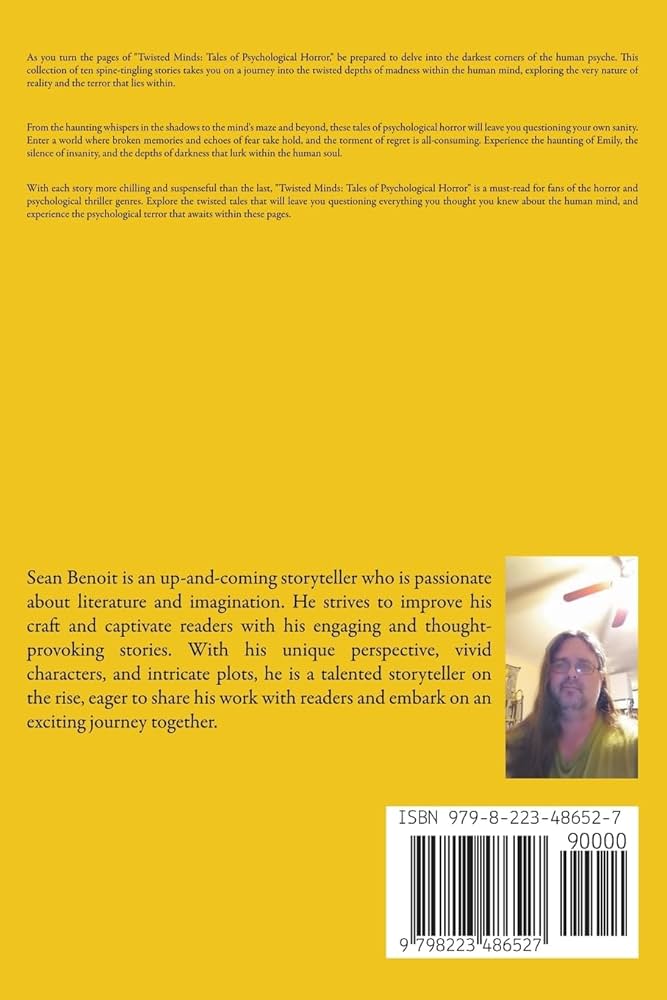Contents
- 1 A Literary Exploration of Fear, Madness, and the Uncanny
- 2 The Strengths of Psychological Horror Books Reviewed
- 3 Weaknesses of Psychological Horror Books Reviewed
- 4 Frequently Asked Questions (FAQs)
- 4.1 What is the difference between psychological horror and traditional horror?
- 4.2 What are some common themes in psychological horror books?
- 4.3 Who are some notable authors of psychological horror books?
- 4.4 What are some of the best psychological horror books to read?
- 4.5 How can psychological horror books be beneficial?
- 4.6 Can psychological horror books be too disturbing?
- 4.7 Are there any psychological horror books that are suitable for younger readers?
- 5 Conclusion
- 6 Closing Words
A Literary Exploration of Fear, Madness, and the Uncanny
Prepare yourself for an unforgettable odyssey into the realm of psychological horror, where fear manifests not from external monsters but from the twisted labyrinth of the human psyche. In this comprehensive literary exposé, we embark on a chilling journey through the pages of some of the most captivating psychological horror books that will leave you questioning the very fabric of reality and the boundaries of your own mind.
Psychological horror literature delves into the profound exploration of fear and its psychological impact, masterfully employing literary devices to evoke intense emotions and disturb the reader’s sense of comfort and security. Unlike traditional horror, which primarily relies on supernatural elements or explicit gore, psychological horror focuses on the subtle nuances of human behavior, the gradual unraveling of sanity, and the sinister workings of the subconscious mind.
Through the deft storytelling of literary masters, psychological horror books captivate readers with their intricate exploration of the human condition. They challenge our perceptions of reality, confront us with our deepest fears, and leave us grappling with the disturbing question: what truly resides within the depths of our own minds?
The Strengths of Psychological Horror Books Reviewed
Immersive and Unsettling Ambiance
Psychological horror books excel in crafting an immersive and unsettling ambiance that seeps into the reader’s consciousness and leaves a lingering sense of unease. Authors meticulously weave together vivid imagery, meticulous world-building, and subtle foreshadowing, drawing readers into a realm where reality and madness intertwine.
Exploration of Complex Characters
At the heart of psychological horror literature lie complex and compelling characters who embark on a transformative journey that tests the limits of their sanity. These characters are often flawed and relatable, making their struggles and fears resonate deeply with readers. Through their eyes, we witness the insidious erosion of certainty and the fragility of the human psyche.
Confrontation of Our Deepest Fears
Psychological horror books confront us with our deepest fears in a safe and controlled environment, allowing us to explore and confront our anxieties without facing real-world consequences. By delving into the darkest recesses of the human mind, these books provide a cathartic experience, offering a sense of relief and empowerment as we overcome our psychological hurdles.
Weaknesses of Psychological Horror Books Reviewed
Potential for Over-Reliance on Trope
While psychological horror books offer a unique and compelling genre, some critics argue that they often rely on familiar tropes and conventions, which can diminish their impact and originality. Over-reliance on predictable plot devices and character archetypes can result in a sense of formulaic predictability, reducing the overall effectiveness of the narrative.
Limited Accessibility for Sensitive Readers
The intense and disturbing nature of psychological horror books may not be suitable for all readers. Some individuals may find the explicit exploration of violence, madness, and the supernatural too intense or triggering. It is crucial for readers to be aware of their own emotional limits and approach these books with caution.
Psychological Horror Books Reviewed: A Comprehensive Table
| Title | Author | Year Published | Synopsis |
|---|---|---|---|
| The Shining | Stephen King | 1977 | A family’s retreat to an isolated hotel for the winter becomes a nightmare as the father succumbs to the sinister influence of the hotel’s dark past. |
| Psycho | Robert Bloch | 1959 | A young woman on the run finds herself trapped in a secluded motel run by a charming but disturbed proprietor. |
